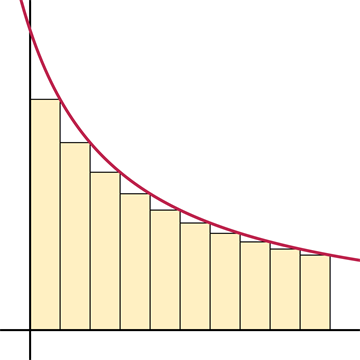
Calculus I
I taught Calculus I three times at Bard College, as well as four times at Cornell University. At Bard, roughly half of the students
were majors in science or economics—fields which require some calculus content—while the other half were students in other subjects who were curious about the material and wished to fulfill the college mathematics requirement.
Main Themes
When teaching Calculus I, I try as much as possible to emphasize those aspects of the
course which naturally appeal to liberal arts students. I talk a lot about the main themes
of the course—infinity and infinitesimals, motion and change—and I make an effort to
connect these themes both to the underlying philosophical questions and to the role that
calculus plays in the sciences. I also make sure to emphasize the numerical and graphical
aspects of calculus, in addition to the traditional algebraic manipulations.
Emphasis on Science
A main theme in my Calculus I course is that calculus is an essential part of modern science and economics. I try to emphasize connections to these fields as much as possible as part of an overall emphasis on mathematical modeling, and I particularly emphasize applications to science when covering related rates. See the following Math Overflow question and my answer for some discussion on my approach to related rates:
Here is a list of some science-based problems from my Calculus I class:
In case you'd like to use any of these in your classes, here is the original LaTeX code:
Precalculus Knowledge
Rather than include an extensive review at the beginning of the course, I like to jump right in to linear functions and the idea of the derivative, and I avoid problems that involve trigonometry or logarithms for the first few weeks. Later on in the course, I spend a full week discussing trigonometry, sinusoidal functions, and the calculus of trigonometry, and then another full week on exponential functions, logarithms, and the associated calculus. I find that starting with derivatives immediately helps to get the students interested right at the beginning of the course, while spending a full week on trigonometry and a full week on logarithms later on helps the students to really come to terms with these topics.
Homework Assignments
My Calculus I course features weekly homework assignments which are designed to make the students think deeply about the subject
matter, as well as to improve their understanding of mathematical modeling and the relationship between mathematics and science.
The assignments reinforce my emphasis on the main themes of calculus, and they highlight the relation to the sciences and economics
as well as the numerical and graphical aspects of the subject. I encourage students to work together on these homework assignments, and I offer help in the form of extensive office hours.
Note that, in addition to these weekly homework assignments, I do assign traditional
calculus problems from the textbook as “practice problems”. I recommend that students
complete these problems, and I have a short in-class quiz each week to check that the students' basic skills
are progressing.
